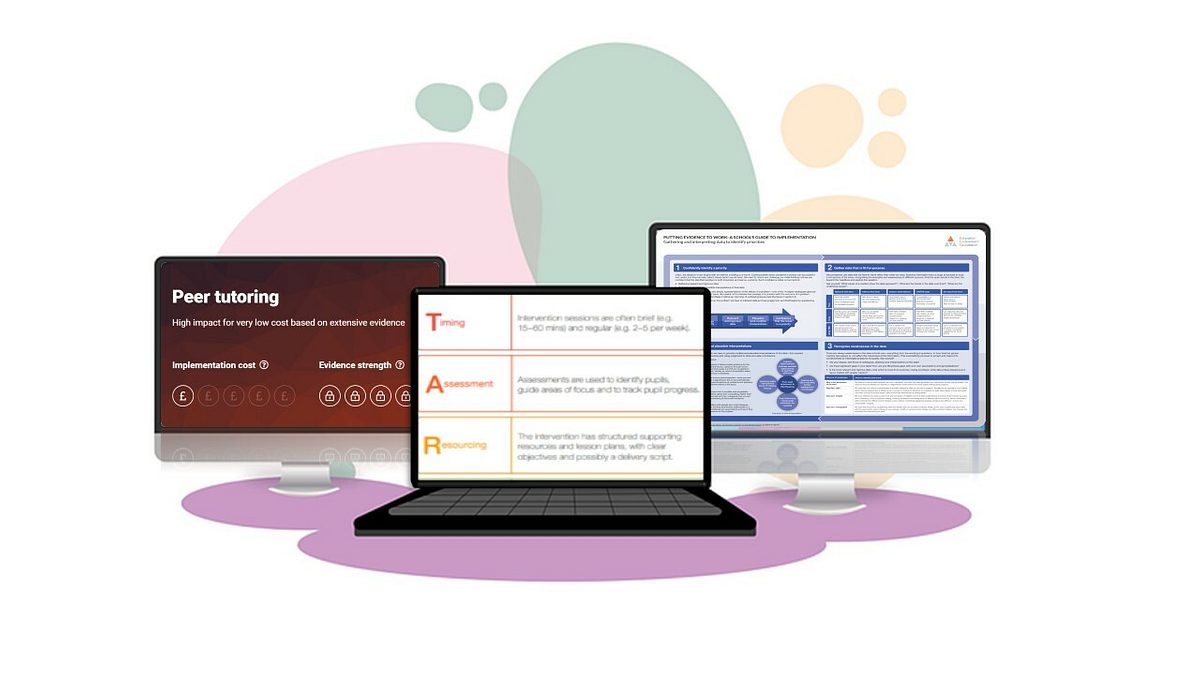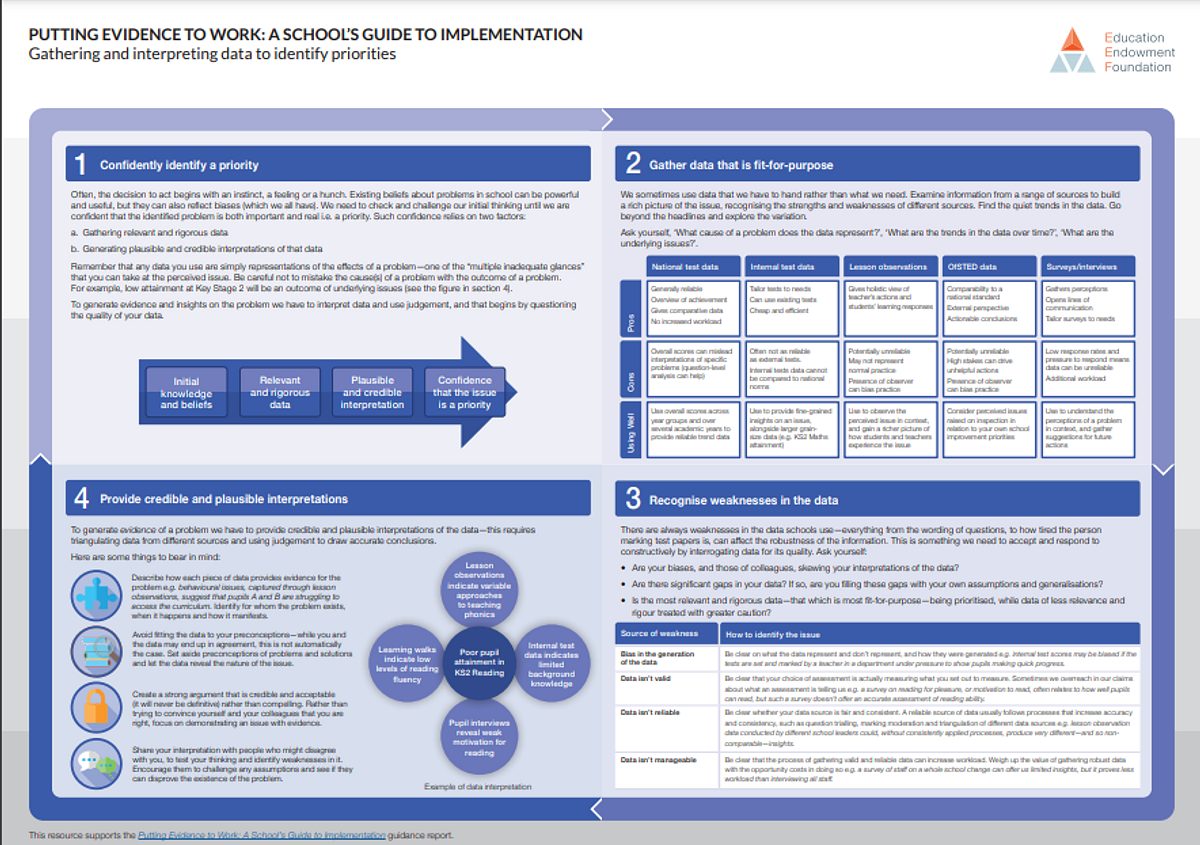
Blog -
Implementation: Engaging People
The EEF’s new implementation guidance report places a focus on engaging people

Share on:

by Bradford Research School
on the
The following is an imagined case study of a school leader using evidence to inform their decisions.
Aqsa has just joined a school as Head of Sixth Form. For the last two years, a peer tutor reading scheme has been in place, where sixth form pupils meet year 10 pupils in the library once a week, choose a book and read it together. The feedback on the scheme has been positive – sixth form pupils have enjoyed the experience and the younger pupils believe it has been beneficial.
What problem are we trying to solve?
The programme seems to be solving a problem – pupils need to develop their reading skills. However, Aqsa wants to ensure that any interventions are targeted towards the most appropriate challenges. She uses the EEF’s Gathering and Interpreting Data tool to test the hypothesis. The steps of this process:
1. Confidently identify a priority
2. Gather data that is fit for purpose
3. Recognise weaknesses in the data
4. Provide credible and plausible interpretations

During this process, she identifies that the data around reading is quite comprehensive. The English department has rich data and uses a bought-in online package to improve reading comprehension and vocabulary knowledge, as well as intervention for KS3 pupils. There has been a consistent increase in pupils’ reading ages since this was identified as a whole-school priority, and now the year 10 pupils are doing better than the previous cohorts.
Instead of looking at reading data, Aqsa looks to subjects that have been underperforming. She identifies that Geography and History data for this cohort is poorer than in other subjects. The school has recently revamped the timetable and these subjects now have three lessons instead of four. Further discussion with subject leads suggests that they are concerned about the impact of what they see as ‘lost’ curriculum time. The subject leads are keen to take advantage of any support.
Read our blog for a deeper dive into the process: What’s Your Problem?
The EEF Toolkit
Aqsa’s next step is the EEF Teaching and Learning Toolkit. The toolkit entry suggests peer tutoring is an effective strategy, but she is keen to understand more about what might make it successful. She is also keen to avoid ‘cherry-picking’ the evidence that supports what they were already thinking of doing. She notices a few messages in the Key Findings section:
1. Peer tutoring, on average, has a positive impact on both tutors and tutees and may be a cost-effective approach to delivering one to one or small group tuition in a school.
2. Peer tutoring seems most effective when used to review or consolidate learning, rather than introducing new material.
3. Training for staff and tutors is essential for success. It is crucial to allocate sufficient time to train both staff and tutors, to ensure training provides structure to the tutoring, and to identify and implement improvements as the programme progresses.
4. Four to ten week intensive blocks with regular sessions (4−5 times a week) appear to provide maximum impact for both tutors and tutees.
Aqsa doesn’t find much about whether this will work for history and geography, as most of the studies focus on mathematics and reading. However, the impact on maths and literacy are similar, which makes her more confident that some of the principles can be generally applied in other subjects. She is also pleased to note that there are benefits for the tutors themselves.
The plan will be to use sixth form pupils as tutors to consolidate knowledge from class. Subject leads will provide discussion frames built around Knowledge Organisers. These frames will provide tutors with questions and activities to consolidate knowledge and identify misconceptions.
There will be training for all sixth form tutors in the strategies. All have studied either history and geography at GCSE and will be allocated to the one they studied. The exam board has changed for History, so there will be an additional session to ensure there are no mixed messages.
The Target Framework
Aqsa then looks at the TARGET approach for selecting targeted interventions, to help her refine the approach.

| Timing | Currently every Monday in tutor time for 30 minutes – extend to include Wednesday tutor time period. This will give a total of one hour per week. |
| Assessment | We have used the overall grades to select pupils, but we will need to generate more useful data to help tutors provide more focused support. |
| Resourcing | The materials are very helpful – in the worst-case scenario the questions can be worked through together. We will speak to tutors and tutees about their thoughts after phase 1 of the programme. |
| Give it time | We have planned to do this all year. We should review after data drops which are every 13 weeks. |
| Expert delivery | We know that 6th formers are not as skilled as teachers, but the sessions will be observed and feedback given. |
| Teacher links | The subject leads have had input, but currently this element is not in place. It will be hard to find time for feedback, but we have now created a simple form with a checkbox to show that the session has taken place, what was covered and space for any feedback. We will monitor the effectiveness of this. |
There is still work to do to ensure effective implementation, but Aqsa is confident that her approach stands a much better chance of success with the steps she has taken.

Blog -
The EEF’s new implementation guidance report places a focus on engaging people

Blog -
We share questions and resources to unpick the EEF’s Voices from the Classroom

Blog -
Investing in Subject Knowledge has Multiple Benefits
This website collects a number of cookies from its users for improving your overall experience of the site.Read more